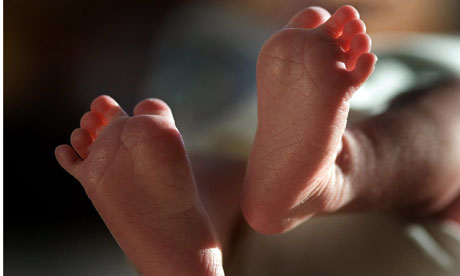
On Saturday evening the bell of the "baby box" in Budapest's Heim Pál children's hospital rang at the intensive care department, signalling that a newborn had been placed in the heated incubator.
It was the fourth time this year that somebody left a baby in the hatch in the garden wall of the hospital – a higher rate than usual.
"We saw on our monitors that a baby was placed in the incubator just about the time the bell was pushed," said Emoke Székely, head physician of the department. "However, we saw nothing more than the baby suddenly appearing in the box. Our cameras are placed in a way to not release any information about the persons using this opportunity. This is the point of this whole facility, to secure full anonymity. In a way it is similar to the practices from previous centuries, when foundling babies were left on church stairs."
The situation is of growing concern to the UN. Hungary pioneered the foundling hatches in 1996 when it opened its first incubator in Budapest's Schöpf-Merei hospital and Mothers in Crisis centre. By the end of 2011 there were 26 in the country, with about 40 babies left in them over the past 15 years, the majority in the past seven.
"Until 2005, leaving a baby in any public place, these 'baby boxes' included, was seen as a crime in Hungary and punished accordingly," said Szilvia Gyurkó, the children rights legal expert of Unicef Hungary. "In 2005 the law was changed. After that, leaving a newborn anonymously in an incubator was not punished anymore, the person making this choice received legal immunity and his/her act was seen as a declaration of abandonment of the child, even though there were no papers signed.
"According to the law, if the family would not return and request the baby in the following six weeks, their 'consent' was given to adoption and the baby could be entered almost immediately in the system."
The relaxation of the law has been controversial. "It shows how 'blind' the legal system can be, and how contradictions in the legislative system persist," Gyurkó added. "Currently, if you leave anonymously your baby in any other place than a baby-saver incubator, you will be searched and if caught, severely punished. If you do the same in an incubator, you are free to walk away, nobody will inquire after you."
The rights of the child, she says, are "severely harmed". "He or she will never have a chance to know her/his birth mother, her/his health history, or siblings," she said.
Opinions in Hungary are polarised on baby boxes, which have been introduced in at least 11 other European countries. Proponents say they result in fewer unwanted newborns being killed at birth. But critics say they are inaccessible to rural women, have done nothing to alter infanticide statistics and have shifted the focus from methods that might make a proper difference, such as counselling, free contraception and help for pregnant women and mothers in need.
Maria Herczog, a sociologist and member of the UN Children's Rights Committee agrees with Gyurkó's assessment. "This is a paradoxical situation in Hungary: while midwife Ágnes Geréb is sent to jail for championing home birth under controlled circumstances, the incubator programme, though indirectly, sends out the mistaken message to pregnant women in crisis that they are right to continue with hiding their pregnancies, giving birth under uncontrolled circumstances, and then abandoning their babies anonymously, losing the possibility to connect with them again."
Herczog said she and many other experts of these issues had advocated a different system, one that would make anonymous childbirth at hospitals possible, similar to the French system. In her view that is an optimal solution for mothers and babies, without erasing the possibility for either that later in their lives they can receive information about each other.
"The baby hatch is an easy and comfortable 'solution' for the state, instead of providing a comprehensive set of policies, services to prevent abandonment," she said. "Currently the system is serving first and foremost the interest of the prospective adoptive parents, who are usually well situated middle-class families, while at the same time indirectly assumes that these birth mothers are irresponsible and unsuitable for motherhood."

